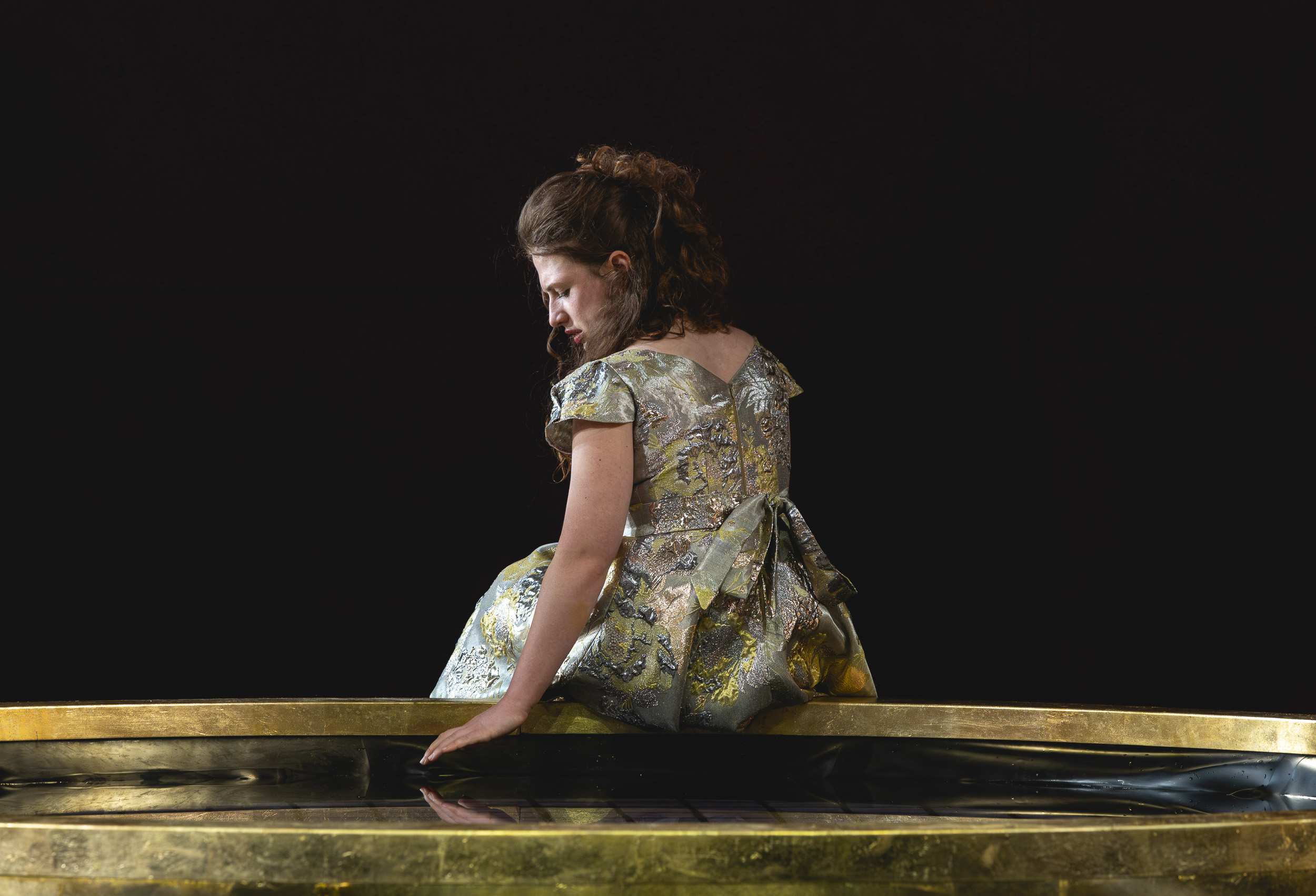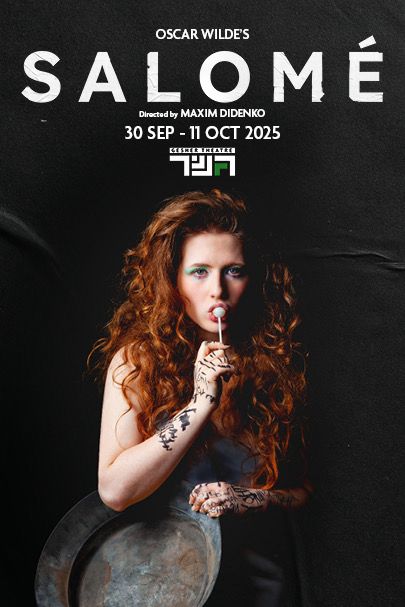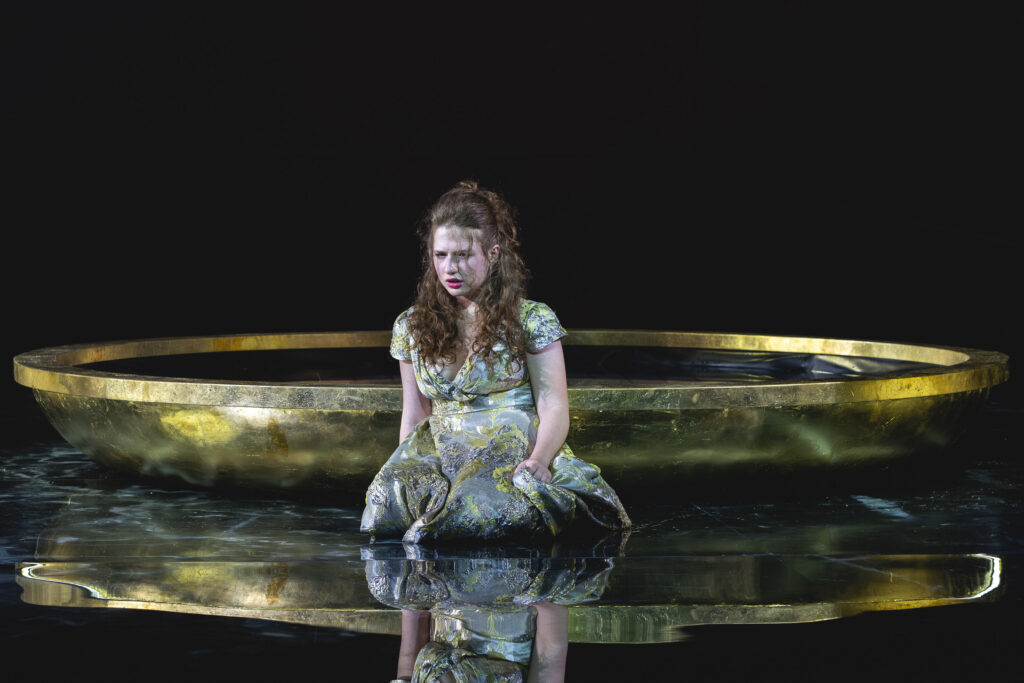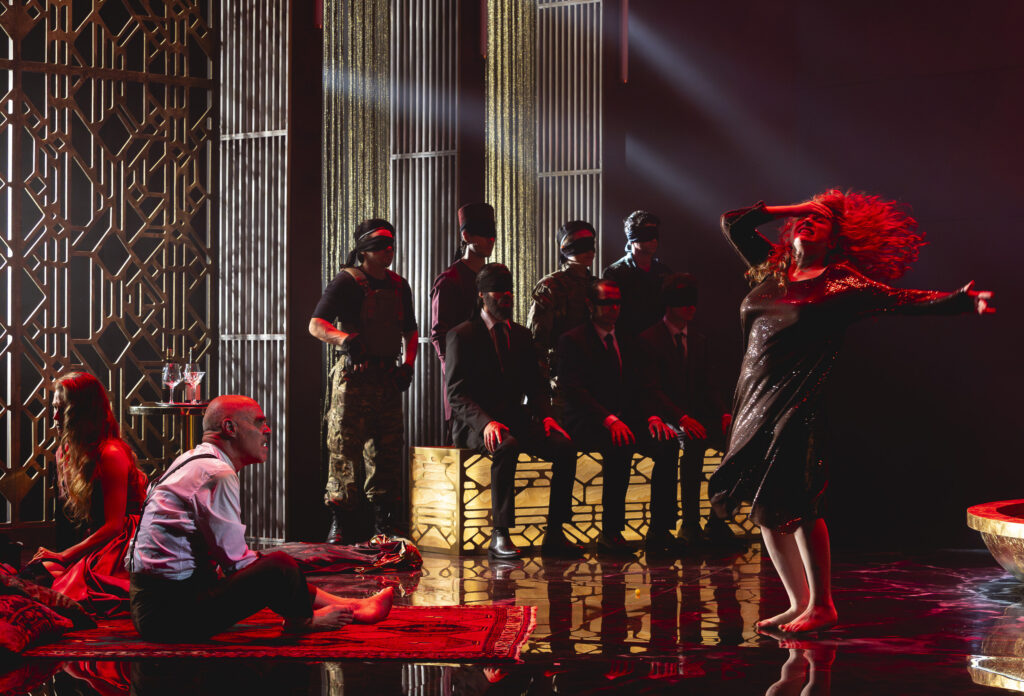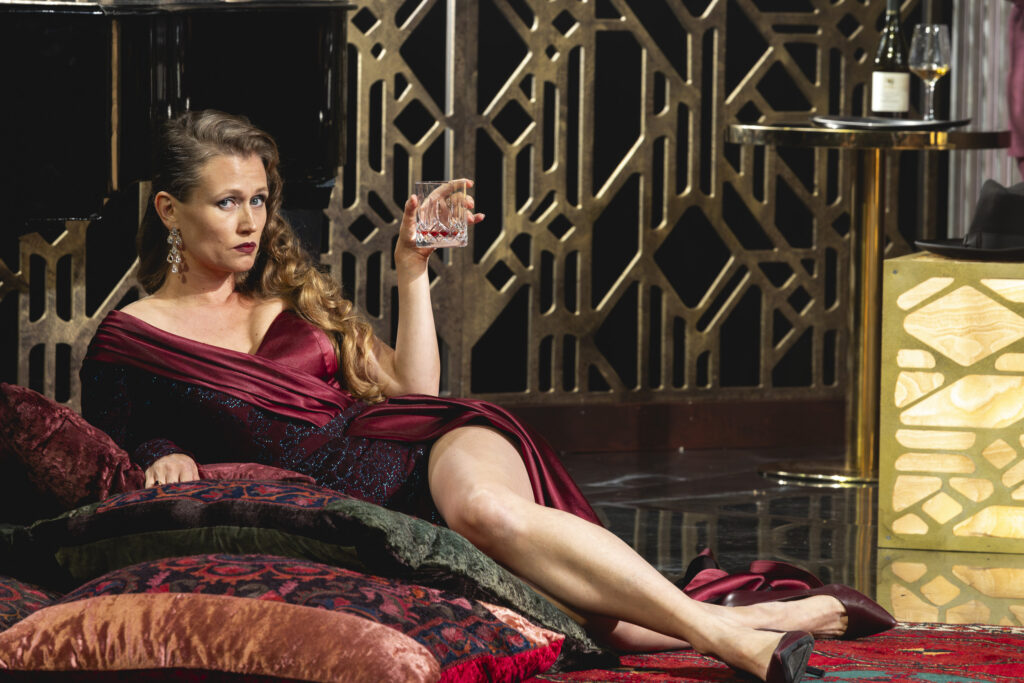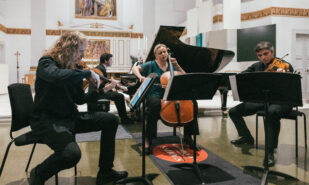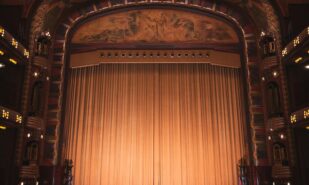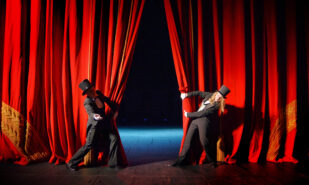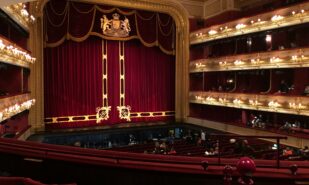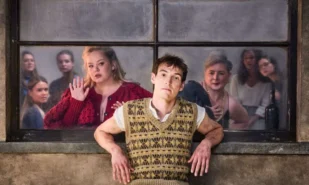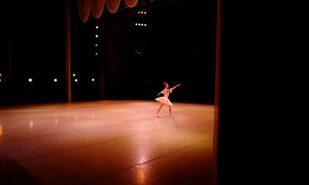Folds of Time: Salome by the Gesher Theatre
The Gesher Theatre’s tour with Salome had been planned from the very beginning of work on the production. And now, after its premiere in Tel Aviv, Salome has been brought to London to face a new audience. Director Maxim Didenko has staged his own version of Oscar Wilde’s famous play.
The stunningly beautiful, stylish set design by Gali Solodovnikova, built on the stage of Theatre Royal Haymarket, evokes a space that can only be described with one word: luxury. Gold, gold, gold—everywhere. Carpets and cushions, the soft glow of matte lamps, the rich shine of a black grand piano. At the center of the stage—a pool with a glowing floor, radiating the same soft light, the same matte luminescence. Water, wine, grapes—ancient as humanity itself. The mesmerizing interweaving of antiquity and modernity is the core theme of the production. Time does not exist. History does not teach. Nothing flows anywhere, it all stands still, like the immobile depth of that glowing pool. The calendar has no meaning; life has no value.
Maxim Didenko stages his Salome directly from Wilde’s text—practically word for word, stage direction for stage direction. And yet, it pulses with a living, desperate energy. One might be tempted to call it “modern,” but what kind of modernity can we speak of, if, as said, there is no flow of time? At times it feels like a theatrical Interstellar, with folds of time shimmering like folds of a golden cloak under which Salome writhes in her feverish dance.
Of course, the dance is the climax of this heavy, word-laden story. The legend is known to all, Wilde’s play is well familiar too, so the point is not in surprising the audience with the plot (everyone knows the terrible prize served on the great platter), but in the means by which the production leads us to it.
The acting here is extraordinary—psychologically deep, meticulously crafted, so much so that even Herod’s guards seem to know everything about their great-grandmothers and what they ate for dinner two days ago. Perhaps because of this—or thanks to it!—each stage image is realized with astonishing precision. Not a single superfluous or inaccurate gesture in the entire hour and forty minutes. And the courage with which the roles are performed deserves its own mention.
Here is Herod, tetrarch of Judea, played by Doron Tavori—a monstrous spider in the uniform of some unknown army, who enters the stage spreading his powerful legs, stretching his clutching fingers, baring, it seems, even his fangs. His lips twist in endless spasms—sometimes a grin, sometimes rage, sometimes a paroxysm of inexplicable origin. He journeys from the master enthroned at the center of this luxurious web, to a writhing larva desperately trying to avoid the fatal decision—to grant Salome the head of the Prophet. His lust for the adolescent stepdaughter is played with a criminal Humbertian intensity, and watching it is an ordeal both for Salome herself and for Herodias—Herod’s wife and Salome’s mother.
Ah, how regally beautiful is this Herodias! How majestically she turns her elegant shoulders, one bared by the extravagant cut of her dress. How easily she strides on towering heels, how proudly she tilts her chin, how the shadows of her long lashes fall across the porcelain glow of her mature but radiant cheekbones. Who knows how one can embody beauty made flesh—but Lena Fraifeld does it, even when Herod openly neglects her character. Not a trace of humiliation—only fury and darkness glimmering in her eyes, like two angels of vengeance. Her weapon will be her daughter.
Neta Roth plays Salome as a spoiled, unhappy, traumatized teenager. From her very first entrance it is clear how heavily her family history has scarred her—she almost physically enacts symptoms of nervous collapse. Her delicate face, like a ripe peach glowing from within, at times distorts into the grin of a spiteful elf. Poor, poor girl. Poor, poor child. It seems as though a mechanism of self-destruction has been triggered inside her, against which she has no defense. No adults are truly near. Her mother is absorbed in herself and her new relationship; her stepfather is nothing but a threat. She would surely have grown into a cold, cruel, savage beast, satisfied with herself—if not for the voice.
And here we come to the most complex figure of the play—the Prophet, Jokanaan. How does one play divine radiance? How does one play holiness? How does one play knowledge itself? Maxim Didenko finds an astonishing solution, relying on the equally astonishing gifts of actor Shir Sayag. Here, everything is in the voice.
It is classified as soprano, but at times it soars into crystalline heights, seemingly beyond even the reach of a countertenor. (Here a fleeting association arises with Ian Gillan and his canonical Jesus in Webber and Rice’s rock-opera Jesus Christ Superstar.) Dark hair frames the face, the eyes are blindfolded with black silk, the prophet wears only a dirty loincloth. His hands are twisted in spasms, his gait is unnatural.
That pure, icy voice resounding from the filthy dungeon seems to pierce Salome through and through: she shudders, stiffens, like someone struck by a mortal wound. She shakes as though shocked by electricity, and she deciphers these spasms as her own desire. As irresistible as her terror.
This girl, who has seen only adultery, death, and fear—how else could she interpret the fainting spell of horror that overtakes her at the sound of the prophet’s voice? The voice truly sounds cosmic. Jokanaan sings at times in English, then slips into Hebrew, like signals from another planet. It gives chills. At times it seems impossible that human lungs could produce such a sound.
The ancient tragedy that Wilde reinterpreted as a story of destructive passion, Didenko reinterprets even more frighteningly—as passion for destruction. Salome’s “I want!”—the cry of a child whom no one will save—rings out like a gunshot.
Her dance is distilled macabre: she crowns herself with a gleaming skull whose teeth snap in rhythm with the music, despite her mother’s desperate pleas not to dance.
Ah, mother—woe to you! What can you do with a child so unhappy, transformed into a demon by the calamities that befell her?
Throughout the play, Didenko refrains from showing blood—even the exquisite Young Syrian, played by Itamar Peres, a tender bamboo shoot disguised as a guard, cuts his own throat with such elegance that there is hardly a drop.
But when Salome sits in the pool, cradling Jokanaan’s severed head, sobbing like a three-year-old, the water around her spreads into a bloody sea—or perhaps into wine, for she instinctively licks the blood from her wrist, as though passing through a terrible communion.
Historically, Salome lived a long life, becoming a queen. But in Wilde’s universe, and following him, in Didenko’s, she could not survive. By Herod’s order, she is killed by the same soldier who killed Jokanaan—a priest of death in a black flak jacket.
Life has no meaning. Time does not exist. Passion is ruinous. The water remains flooded with blood.

